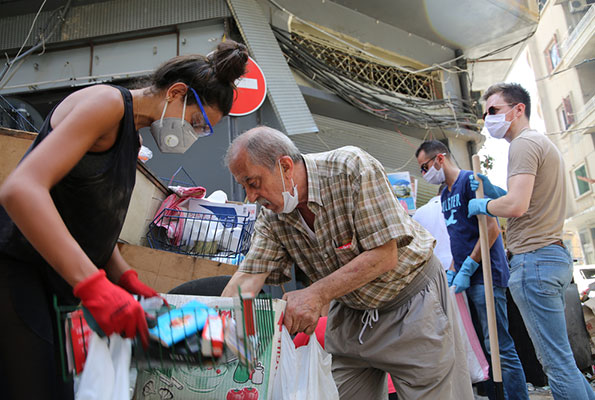Beirut, the capital of Lebanon, has evolved into a city of contrasts. Rich automobiles sit in front of well-known eateries and nightclubs, whereas the commoners scavenge through the trash for anything to eat.
Additionally, more and more people, primarily youngsters but also older adults, are begging on the streets, according to Anna Fleischer, director of the German Heinrich Böll Foundation’s office in Beirut, who spoke to DW.
“It may be presumed that there are many Syrian refugees, but there are also Lebanese,” she continued, adding that it is difficult to determine the nationality.
The COVID and the 2020 Beirut blast have made the country’s economic crises and years of political instability almost irreparably unstable.
According to the World Bank, Lebanon not only has one of the “most severe crises in the world since the middle of the 19th century,” but it is also probable that “an unprecedented institutional vacuum will further delay any agreement on crisis resolution and critical reform ratification, deepening the woes of the Lebanese people.”
Shrinking Middle Class & Increasing Hunger
Middle-class life in Lebanon has all but disappeared severe recession and a 95% devaluation of its currency. As a result, the World Bank downgraded Lebanon to a lower-middle-income nation in 2020.
According to Hussein Cheaito, a development economist at The Policy Initiative, a research group based in Beirut, “A person earning 1,500,000 Lebanese pounds used to have an equivalent of USD 1,000 before the crisis, and it is now equivalent to less than USD 200.”
Lena Simet said in a recent Human Rights Watch (HRW) report on rising hunger and poverty in Lebanon that “millions of people in Lebanon have been forced into poverty and have cut back on food,” thus pointing towards the growing food insecurity within the country.
Arab Barometer reported that over half of all Lebanese individuals said they ran out of food before they had the money to buy more in a September 2022 report on food insecurity in the Middle East.
Massive Wealth Disparity
Hussein Cheaito told DW, “Lebanon’s tax system is highly regressive, which means that there is no wealth tax code and business taxes are among the lowest in the world compared to all OECD averages.”
Because this 1% owns more than 70% of the national income, Cheaito claimed that the political class and their business links benefit from the taxation system. This thus only leaves a tiny portion of money for the rest of society, according to him.
Another drawback affects people who receive financial aid from charitable organizations or who receive their pay in Lebanese pounds. Banks only permit certain cash withdrawals in US dollars from accounts with US dollars.
Lebanese banks have also maintained the pegged exchange rate of USD 1 to 1,500 Lebanese pounds for the past 20 years. On February 1, though, this will be changed to USD 1 to 15,000 pounds. Even while this is ten times more, the exchange rate is still well below what is being utilized on the illegal market. The exchange rate at the moment is USD 50,000 to the dollar.
Contrarily, living has become reasonably affordable for individuals who work for multinational corporations or have other access to dollars, which also explains the bustling cocktail lounges and fully booked restaurants.
Dollarization
Remittances from family members who live abroad are currently one of the most significant sources of income for families, according to Lynn Zovighian, co-founder and managing director of ‘The Zovighian Partnership’.
The official stated, “Lebanon is likewise going through a de facto dollarization of its economy, although not by law or policy, due to the collapsing private sector and anticipated shrinkage of the public sector. This is taking place without price limits or sanctions for financial wrongdoing.”
The Lebanese government and the International Monetary Fund (IMF) have been in talks, and their discussions have resulted in a staff-level agreement for a program that will cost around USD 3 billion over the next 46 months. Nevertheless, there was no plan to safeguard society’s most helpless.
The scale of the losses in the financial industry, which are at least USD 70 billion, means that three billion dollars “would not be enough to get the country back on its feet,” according to Chaeito.
In addition, the IMF accord made clear that Lebanon should concentrate on state-owned businesses and the privatization of social and public services given the fragility of its government and public sector.
Stability Of The Macroeconomy
What assurances are there that private businesses won’t raise prices and cause more inflation, as we’ve seen in Latin America? According to the researchers, this might indicate that only the wealthy will have access to services.
Experts believe that macroeconomic stabilization is the only way to prevent the nation’s collapse and the subsequent departure of most of its citizens.



